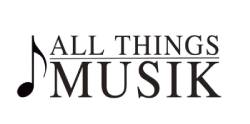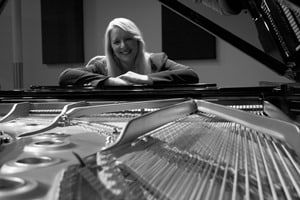“Should I Buy a Piano or a Keyboard for Piano Lessons?”
By Emily Kline
The phone rings at noon on a Monday. “All Things Musik, this is Emily, how may I help you?” The curious mom on her lunch hour says, “Hi, my child wants to take piano lessons but I don’t know where to begin.”
Inevitably, one of her questions is about buying a piano. Although All Things Musik is not a piano retailer I have advice for families asking this important question.
I think the two big questions to think about when considering a piano purchase are:
- Do you think your child or children will take piano lessons (and practice) for many years?
- How much do you want to invest (yes, it’s an investment) in a piano?
There are several related questions that fall under the umbrella of these two questions.
First question: Do you think your child or children will take piano lessons (and practice) for many years? If the answer is “I don’t know” then you may want to consider a bargain basement priced piano or a quality keyboard. The principle advantage of keyboards is their portability. They’re low maintenance, and with headphones you won’t be hearing the sometimes rough practice sessions. A good keyboard should have 88 weighted keys and a foot pedal. Expect to pay at least $450 for a new keyboard.
If your child loves taking lessons after a year or so (or you insist they stick with it for a while) then a piano purchase is probably right for you.
Second question: How much do you want to invest (yes, it’s an investment) in a piano? A quality, well maintained acoustic piano tends to hold its value and depreciate slowly or even appreciate. Many consider a piano a focal point in their home’s interior design and a piece of furniture. Beautiful grand and upright pianos can cost thousands to purchase but often last for generations. If taking out a huge loan for a grand piano is not for you, there are many good pianos on the private market or from reputable retailers like Schmitt Music (in Edina, Rochester, Brooklyn Center and elsewhere in Minnesota). These retailers stand behind their new and used pianos and cater to all budgets.
Technology is making its way into piano and keyboard manufacturing. Like a home computer, keyboards processors and parts won’t stay the latest and greatest very long. Expect the value of your keyboard to drop by half after 18-24 months. Many piano makers like Yamaha and Kawai are offering hybrid acoustic-digital pianos. Hybrids are excellent and affordable choices for tech-savvy kids who want that “cool” factor and parents want virtually no maintenance costs.
When considering a piano from a private seller, do your homework first. Read online reviews about the make and model. Ask the seller about the piano’s history. Ask how often it was tuned. Ask where it was in the house (heaven forbid it was in a garage). Ask why they’re selling it. Before you make the decision to buy, consider having a professional piano tuner inspect it. A cracked sound board or a horribly out of tune piano can affect your initial investment. All Things Musik can recommend a tuner who can inspect the instrument.
Part of your investment in a piano includes regular tunings. Humidity levels, the age and condition of your piano, and other environmental factors in your home can affect your tuning schedule. Once a year is minimal but your tuner can recommend otherwise. A well maintained piano will provide decades of beautiful music!
Whether you buy a keyboard or a piano, starting your child out on the right foot by providing an instrument they can enjoy practicing on regularly is very important.


Leave A Comment